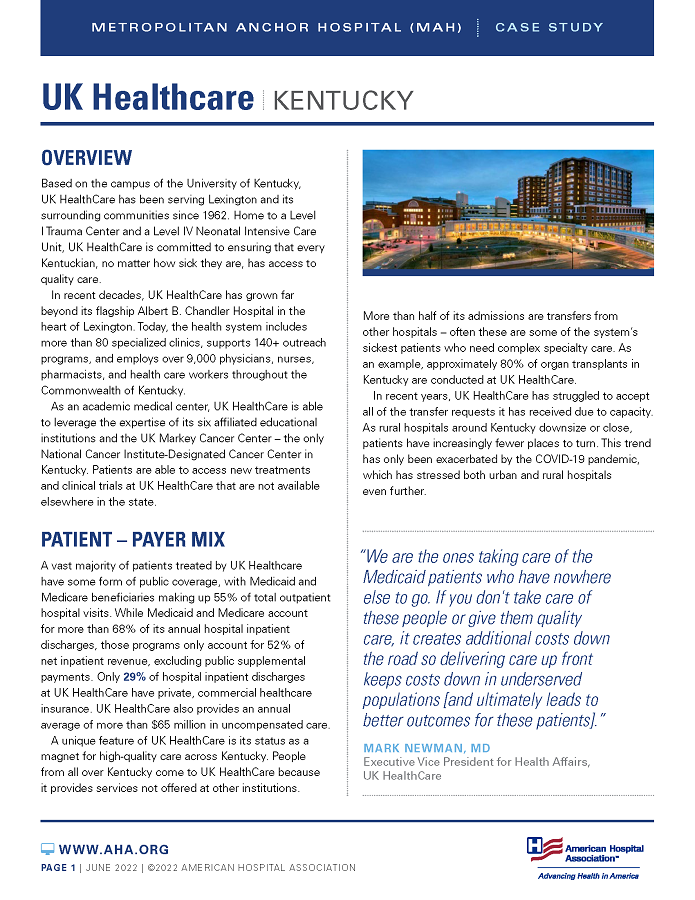

UK Healthcare | Kentucky
Metropolitan Anchor Hospital (MAH) | Case Study
Overview
 Based on the campus of the University of Kentucky, UK HealthCare has been serving Lexington and its surrounding communities since 1962. Home to a Level I Trauma Center and a Level IV Neonatal Intensive Care Unit, UK HealthCare is committed to ensuring that every Kentuckian, no matter how sick they are, has access to quality care.
Based on the campus of the University of Kentucky, UK HealthCare has been serving Lexington and its surrounding communities since 1962. Home to a Level I Trauma Center and a Level IV Neonatal Intensive Care Unit, UK HealthCare is committed to ensuring that every Kentuckian, no matter how sick they are, has access to quality care.
In recent decades, UK HealthCare has grown far beyond its flagship Albert B. Chandler Hospital in the heart of Lexington. Today, the health system includes more than 80 specialized clinics, supports 140+ outreach programs, and employs over 9,000 physicians, nurses, pharmacists, and health care workers throughout the Commonwealth of Kentucky.
As an academic medical center, UK HealthCare is able to leverage the expertise of its six affiliated educational institutions and the UK Markey Cancer Center – the only National Cancer Institute-Designated Cancer Center in Kentucky. Patients are able to access new treatments and clinical trials at UK HealthCare that are not available elsewhere in the state.
Patient–Payer Mix
A vast majority of patients treated by UK Healthcare have some form of public coverage, with Medicaid and Medicare beneficiaries making up 55% of total outpatient hospital visits. While Medicaid and Medicare account for more than 68% of its annual hospital inpatient discharges, those programs only account for 52% of net inpatient revenue, excluding public supplemental payments. Only 29% of hospital inpatient discharges at UK HealthCare have private, commercial healthcare insurance. UK HealthCare also provides an annual average of more than $65 million in uncompensated care.
A unique feature of UK HealthCare is its status as a magnet for high-quality care across Kentucky. People from all over Kentucky come to UK HealthCare because it provides services not offered at other institutions. More than half of its admissions are transfers from other hospitals – often these are some of the system’s sickest patients who need complex specialty care. As an example, approximately 80% of organ transplants in Kentucky are conducted at UK HealthCare.
In recent years, UK HealthCare has struggled to accept all of the transfer requests it has received due to capacity. As rural hospitals around Kentucky downsize or close, patients have increasingly fewer places to turn. This trend has only been exacerbated by the COVID-19 pandemic, which has stressed both urban and rural hospitals even further.
“We are the ones taking care of the Medicaid patients who have nowhere else to go. If you don't take care of these people or give them quality care, it creates additional costs down the road so delivering care up front keeps costs down in underserved populations [and ultimately leads to better outcomes for these patients].”
Mark Newman, MD
Executive Vice President for Health Affairs, UK HealthCare
UK Healthcare's Unique Approach to Care
Combating Kentucky’s Opioid Crisis
Opioid overdoses claimed the lives of more than 1,900 Kentuckians in 2020. To help combat this troubling trend, UK HealthCare offers substance use treatment programs such as “Beyond Birth,” which aims to help pregnant women living with addiction receive pre-natal and obstetric care as well as social support after childbirth.
UK HealthCare was also one of four medical centers around the country asked to participate in the National Institute of Health’s HEALing Community’s Study which aims to reduce opioid overdose deaths by 40% over three years by evaluating a set of evidence-based prevention and treatment interventions. The $350 million initiative centers on measuring the impact of integrating evidence-based prevention, treatment, and recovery interventions across primary care, behavioral health, and the justice system.
Specialized Care for Victims of Child Abuse
UK HealthCare is home to one of the only pediatric forensic medical programs in the state – a distinction that is due to Kentucky’s unfortunate designation as the #1 state for child abuse.
The program offers assessment and treatment for pediatric and adolescent patients with the systematic goal of identifying and preventing child abuse. Through community partnerships with Kosair Charities and the Children’s Advocacy Center of the Bluegrass, UK HealthCare is working to end child abuse through prevention strategies, community engagement, and the promotion of effective policies to improve the safety of children.
Metropolitan Anchor Hospitals Need Greater Support
Like many other Metropolitan Anchor Hospitals (MAHs), UK HealthCare has faced significant challenges due to the COVID-19 pandemic. As an institution that serves a high volume of Medicare, Medicaid, and uninsured patients – many of whom have complex care needs – continued investment in community programs has become increasingly hard under current financial constraints.
Without stable reimbursement, the specialized programs at UK HealthCare designed to serve traditionally marginalized populations will be put at risk. Federal policymakers must do more to ensure systems like UK HealthCare are able to obtain sustained, adequate support so its leadership can plan for the future and build upon the success of its many specialized programs.


